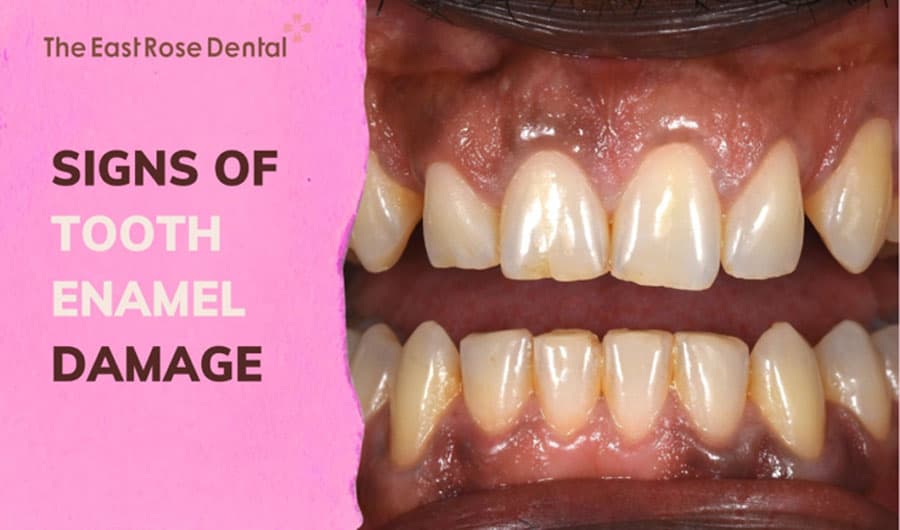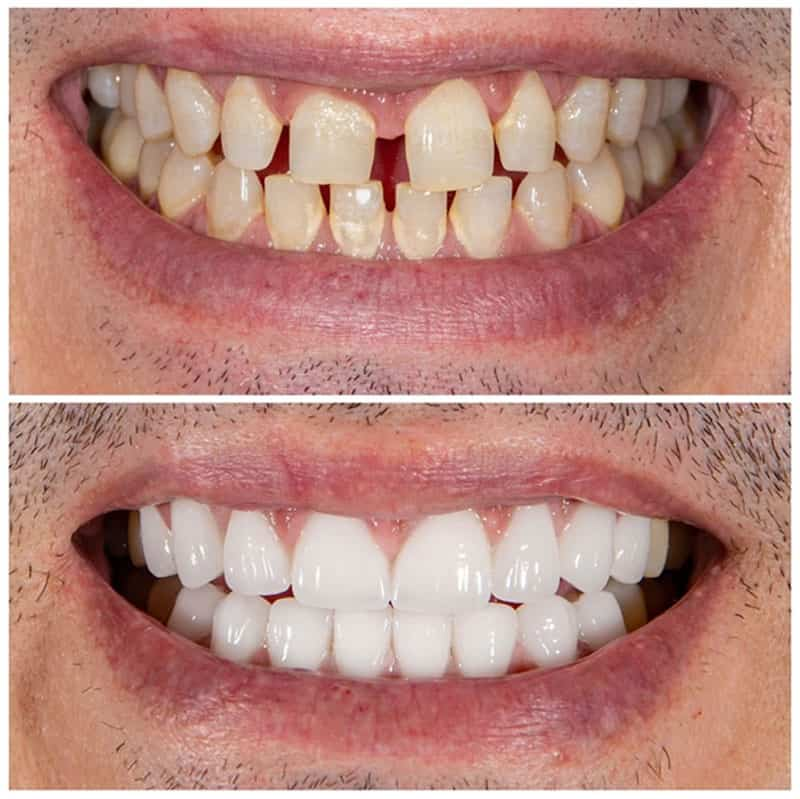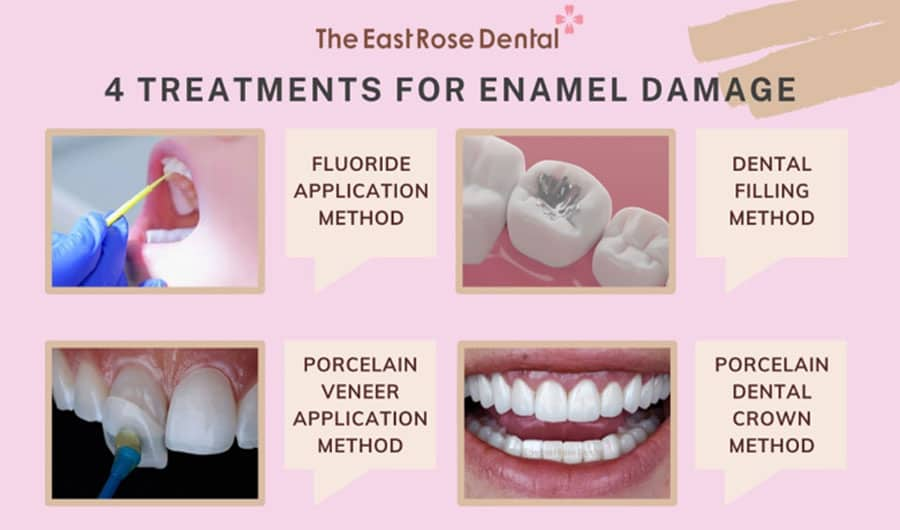4 Signs of Damaged Tooth Enamel and Effective Remedies
Tooth enamel, the outer protective layer of the teeth, plays a crucial role in maintaining oral health. However, due to various reasons, enamel can be damaged, leading to significant issues. This article by The East Rose Dental Clinic aims to help you recognize signs indicating damaged enamel and provide effective remedies.

Understanding the Functions of Tooth Enamel
Tooth enamel is the hard, outermost protective layer of the teeth, primarily composed of minerals, with hydroxyapatite crystals, a form of calcium phosphate, making up the majority. The structure of enamel includes:
- Hydroxyapatite crystals: Provide hardness and resistance to erosion for enamel.
- Organic matter and water: Although in smaller proportions, contribute to the flexibility and resilience of enamel.
- Other mineral ions: Such as fluoride, help enhance strength and acid resistance.
Because of its intricate makeup, enamel is compared to a shield that keeps teeth sturdy and serves a number of important purposes, including:
- Protecting Teeth: Enamel safeguards the dentin and pulp inside from bacteria, acids, and harmful elements in the external environment.
- Chewing Resistance: Enamel's high hardness allows teeth to withstand the pressures of chewing and grinding food.
- Preventing Cavities: The smooth surface of enamel reduces bacterial adhesion, thereby minimizing the risk of cavities.
- Maintaining Aesthetic Appearance: Enamel contributes to the natural whiteness of teeth, ensuring a bright and confident smile.
4 Alarming Warning Signs of Damaged Enamel
Damaged enamel can lead to various serious oral health issues if not detected and treated promptly. Below are warning signs compiled by The East Rose Dental Clinic that you should be aware of to protect your smile.
Highly Sensitive Teeth
When enamel wears down, hydroxyapatite crystals are lost, reducing the strength of the enamel layer. This makes teeth more sensitive to substances like cold water, hot water, carbonated drinks, or sweet foods. Eroded enamel also decreases the teeth's thermal insulation ability, intensifying sensitivity.
Additionally, damaged enamel can increase the risk of cavities, as the sturdy protective layer that prevents bacterial and acid infiltration is no longer present.
Tooth Discoloration
One of the most noticeable signs is teeth turning yellow or darker in color. When enamel wears down, the outer protective layer of the teeth loses strength, exposing the dentin underneath. As a result, teeth may lose their natural whiteness and appear pale yellow or have uneven white spots instead.

This often occurs due to enamel erosion caused by acids from food, drinks, or bacteria, and it's an early sign of dental weakening. Early and regular care by dental professionals can effectively prevent or address this condition.
Read more: Understanding Tetracycline-Stained Teeth and Effective Treatment Methods
Prone to Breaking When Chewing Hard Foods
When enamel is weakened, teeth become more vulnerable to damage from hard foods. Enamel protects the dentin and pulp inside the teeth from bacteria and harmful agents. When enamel wears down, this protective layer loses its hardness and ability to withstand pressure, making teeth more prone to chipping or breaking. This can also lead to more serious issues, such as cavities and periodontitis.
Dents or Holes Appearing on Tooth Surfaces
When enamel is severely damaged, the protective layer of the teeth loses its strength and ability to resist acid. This makes the teeth more sensitive and vulnerable to damage from acidic foods and drinks. If you notice dents or holes on the surface of your teeth, immediate treatment is necessary to prevent more severe, irreversible conditions.
Effective Methods for Addressing Enamel Damage

Strong and healthy enamel will help you avoid serious dental conditions, especially by creating a bright and confident smile. Therefore, protecting and treating enamel in a timely manner will help you minimize certain risks. Here are some methods to effectively address enamel damage.
- Fluoride Treatment for Level 1: This method helps protect and regenerate worn enamel, reducing the risk of cavities and increasing the durability of other dental restorative materials.
- Dental Filling for Level 2 Damage: Using restorative materials to treat and restore decayed and hollow areas of the teeth, preventing bacteria from penetrating deep into the dentin.
- Porcelain Veneers for Level 3 Enamel Damage: Applying porcelain veneers to cover dents and chips on the tooth surface, preventing further enamel erosion.
- Porcelain Crowns for Severe Level 4 Damage: Particularly useful when there is significant enamel loss and decay, helping to protect and effectively strengthen the tooth.
Read more: Ultra-thin porcelain veneers - Modern technology for a Hollywood smile
Protecting tooth enamel is key to maintaining oral health and a radiant smile. Recognizing early signs of enamel damage and applying timely corrective methods will help you keep your teeth strong and healthy. The East Rose Dental Clinic is always ready to support you with comprehensive and effective dental care services.
For dental checkup & consultation with dentist at The East Rose Dental
- Click here to book an appointment online directly : https://eastrosedental.com/en/contact.html
- SMS, Viber, Zalo, Whats App, Skype: +84 90 8 321 455
- Hotline: (+84)908 321 455 - (+84)931 857 885
The East Rose Dental – Since 2000 – Top 2nd - All On 4 Vietnam
➮ Clinic District 2: 166 Dong Van Cong, Thanh My Loi Ward, District 2, Ho Chi Minh City (adjacent to Vista Verde apartment).
➮ Clinic District 1: 30-36, 2nd floor Phan Boi Chau, Ben Thanh Ward, District 1, Ho Chi Minh City (at the East Gate of Ben Thanh Market).
Services
Working Time
- Monday - Friday: 08:00 - 19:00
- Saturday: 08:00 - 18:00
- Sunday closed
Contact Info
- Hotline 1: (+84) 908 321 455
- Hotline 2: (+84) 931 857 885
- Mobile: (+84) 8 3925 8778
- Phone: (+84)2 838 258 778
- info@dentalrose.net
- rosedentalclinicvn@gmail.com
 English
English  Tiếng Việt
Tiếng Việt

